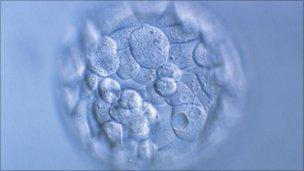Checks 'predict embryo success'
- Published

The research looked at blastocysts which form a few days after fertilisation
US scientists say they have developed a technique to accurately predict which IVF embryos have the best chance of success.
The Stanford University team looked at cell division speed in the first days of embryonic development.
Those developing at a certain rate were more likely to mature into "blastocysts", ready for implantation.
The Nature Biotechnology paper could help shed light on why some couples do not produce viable embryos.
Picking winners
One of the problems of IVF is often not the fertilisation process itself, but picking the fertilised eggs which have the greatest chance of producing a successful pregnancy.
It is generally recognised that those embryos which have become "blastocysts" - a ball of 70 to 100 cells - by the sixth or seventh day after fertilisation are the most likely candidates.
Many IVF clinics, particularly in the UK, now wait this long before choosing embryos for implantation, but the Stanford research may offer a way of working this out more quickly.
The Stanford team used time-lapse cameras to record the development of thawed embryos, and found that those which ended up as blastocysts had similarities in those early days.
These were in the way the cells divided to form two new cells - the speed of one part of the first division, the gap between first and second divisions, and then whether the resulting cells divided again at roughly the same moment.
All this normally happens within the first two days of development, potentially offering a quick answer to whether or not an embryo is likely to make the grade.
Potential savings
Professor Reijo Pera, who led the study, said she was surprised to be able to predict with such accuracy.
"We've always thought of embryos as living or dying, but in reality we find that each cell in the embryo is making decisions autonomously.
"No one has ever looked at this before."
The lack of previous studies reflects the scarcity of human embryos available for research. Tests in mouse embryos are less reliable because unlike human embryos, the vast majority of these reach blastocyst stage.
Dr Virginia Bolton, a consultant embryologist from Guy's and St Thomas' Hospital in London, said that while the find was unlikely to improve IVF success rates in the UK, where fewer, more-developed embryos were returned to women, there might still be benefits.
She said: "Those extra few days of looking after embryos involve a great deal of expense in terms of staff and laboratory facilities - so there could be savings for patients in financial terms."
"But what's interesting is there have been so few studies of this type, and slowly we can look more closely at something we have witnessed for so long."
- Published20 July 2010
- Published29 September 2010
- Published28 June 2010